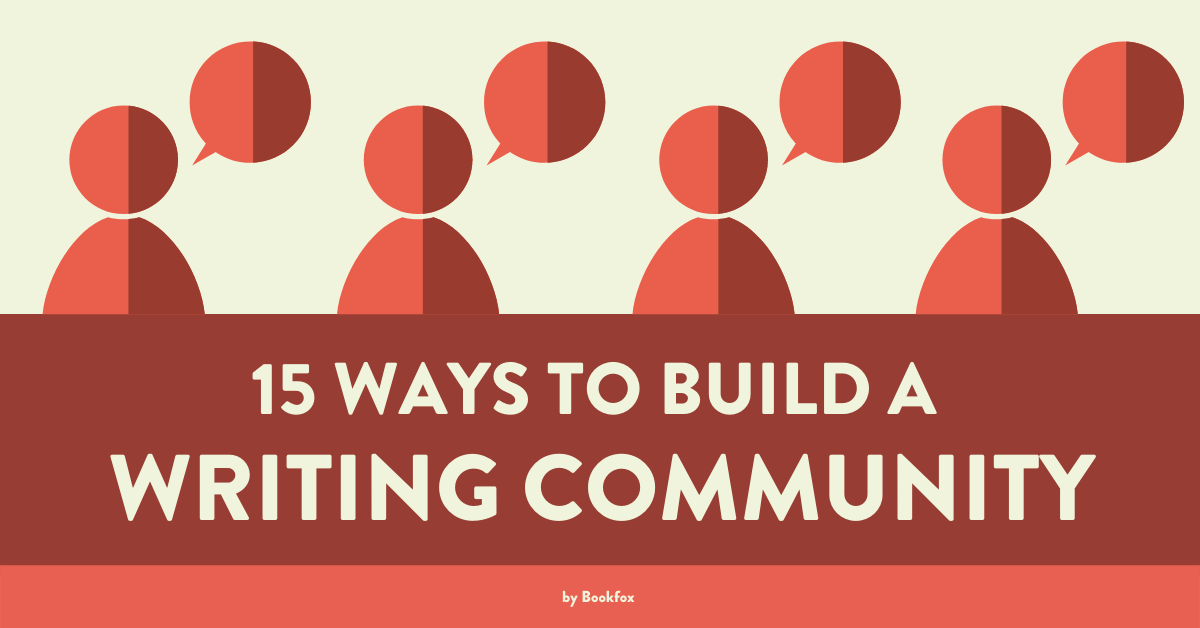 Hey Bookfoxers, it can be difficult to find a writing community in your area, even if you’re an established writer.
Hey Bookfoxers, it can be difficult to find a writing community in your area, even if you’re an established writer.
It’s especially hard if you’re not in a major metropolis. I mean, writers are on in every street corner in San Francisco or New York, but if you’re in a smaller city or suburbs or a rural community, it becomes increasingly difficult to find fellow writers.
Let me help you out. I’ve gotten some years under my belt in building my own writing community, living in places where it was easy (New York, Los Angeles) and also places that have been much more difficult (Orange County). I currently live in Orange County, which is not in the sticks but which seems to have a much lower percentage of artists (including writers) than most urban centers.
These are the tips and techniques I gained through trial and error (okay, mostly error), but I promise you they do work if you can put in a little elbow grease and apply some people skills.
1. Use Twitter’s Advanced Search
Did you know that you can search for Twitter users just in your area? Just go to Twitter’s Advanced Search and you can look up any keywords or hashtags from people in your city or county.
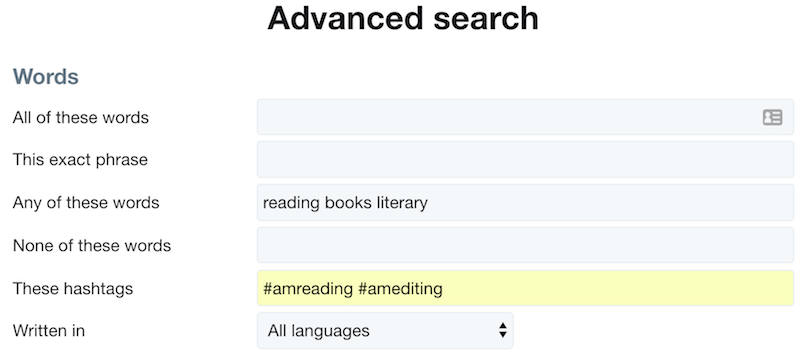
You might have to try a variety of key words and hashtags for this to work, but I guarantee you can find hundreds of writers in your area using this method. Just make sure to click “Near This Place” to turn on geolocation.
Then you just Tweet them (Don’t message them! That’s only for spam!) that you live in the area too, and suggest meeting up, joining a writing group, or visiting a reading together. If you really want this to work, it helps if you buy their book beforehand and tell them you did (compliments are always good! Be interested in them).
For you skeptics out there, here’s my personal story of how Twitter can be a great way to meet other writers. I met my great friend Blake Kimzey, the director of Writing Workshops Dallas, this way. He just looked me up on Twitter, then we met for drinks, and we’ve been going to writing conferences, sharing our writing, and collaborating ever since.
2. Tap Into the Local Professors
 If you have a university around you, find the professor or professors who teach creative writing. It’s best if you can find a full time creative writing professor, not just an English professor, because they’re very different fields.
If you have a university around you, find the professor or professors who teach creative writing. It’s best if you can find a full time creative writing professor, not just an English professor, because they’re very different fields.
Most university professors list their school email on their website, and you should email them and ask what writers they know in your area.
If you’re young, you can ask them for the names of recent graduates who you could join a writing group with; older writers might want to ask for more established writers.
Personal example: Back when I was a college professor, a local writer who had just moved to the area used this technique on me, and I was able to direct him to several local resources for writers.
3. Ask Your Local Librarian
 Libraries are the temples of writers, and you’ll find that writers tend to gravitate toward them.
Libraries are the temples of writers, and you’ll find that writers tend to gravitate toward them.
Most libraries will have a community message board advertising a local writing group, but if they don’t, take some initiative and post your own sign there, and tell all the librarians about it so they can refer people.
It might take a few months, but you’ll be able to cobble together a group of writers this way.
4. Own the Local Coffee Shop Bulletin Boards
 I can’t even count how many times I’ve seen postings for writing groups on coffee shops message boards. I mean, coffee shops are basically where most writers work, when they get sick of their house, so it’s the perfect place to network.
I can’t even count how many times I’ve seen postings for writing groups on coffee shops message boards. I mean, coffee shops are basically where most writers work, when they get sick of their house, so it’s the perfect place to network.
I’m not talking about Starbucks, but all the independent ones in your areas. Those are more likely to have message boards for community building.
Once again, if you don’t see anything, I would recommend posting your own call for a writing group, with little rip-offs on the bottom with your phone number. It will be a trickle of writers contacting you, but you will start to slowly build a community.
5. Local Literary Magazines

Use Google to search for local literary magazines:
[Your city name + Literary Magazine, or Your City Name + Literary Journal]
Then, email the editors. Don’t ask them a question about publishing with them! Have another plan to connect — exchanging work, starting up a writing group, going to a conference, etc. They will be so surprised that you’re not someone just angling to get in their magazine, they’ll probably be open to whatever you’re suggesting.
Now, you’re usually NOT looking for a university literary magazine. These will be fully staffed, and will be pretty insular and limited to current college students, so you’re looking more for independent literary magazines. These will always be looking for local writers, both for help and for community.
This is also a great way to get work as a slush pile reader. Journals and magazines always need more readers, and there is no better experience for a writer than to work as a slush pile reader. Seriously. It will make you so much more sympathetic to agents combing through thousands of email submissions and to editors combing through thousands of magazine submissions. You’ll realize what it takes to get noticed quickly and how rejection is never personal.
6. Start up a Website
 Okay, I know this sounds complex, but you can start up a website with minimal costs and not that much writing and get to the top of Google in a year.
Okay, I know this sounds complex, but you can start up a website with minimal costs and not that much writing and get to the top of Google in a year.
Use Wix or Squarespace and buy the domain name you want through them. I swear to you that you can get this done in a single day.
Domain Name: Name of Your City + [a term like “Writing Group” or “Community of Writers”]
That way, whenever anyone in your area searches for community, yours will be the site they find! And then you can reach out to them and decide how they fit in your writing ecosystem. Could they be a:
- Beta reader for your work?
- Resource for the writing life?
- Mentee or Mentor?
- Conference buddy?
If you’re going to be in one location for a long time, this is a surefire way to have other writers regularly finding you.
7. Go to Local Readings
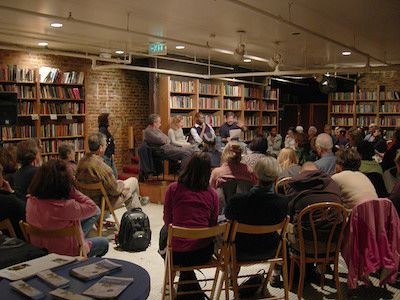 What spaces host writers when they swing through the area? These are some spaces to monitor and try to discover readings:
What spaces host writers when they swing through the area? These are some spaces to monitor and try to discover readings:
- Local independent bookstores
- Used bookstores
- Libraries
- Universities (who often have visiting writers give a public reading)
You can also check out your favorite authors right after they publish a book and look at their touring schedule (which they should have posted!). See if they’re coming to a city near you and note where they are reading — that’s the place you want to visit.
It might take a few readings for you to realize who the locals are, but your continued presence at readings will earn you friends. Talk to people who show up, just making friendly conversation, and you’ll find that half the people there are fellow writers.
8. Find Local Writing Workshops
 Most neighborhoods have some kind of writers group that meets. So use the name of your city and nearby cities and see if there is a “Writing Workshop” nearby.
Most neighborhoods have some kind of writers group that meets. So use the name of your city and nearby cities and see if there is a “Writing Workshop” nearby.
I would also say that you shouldn’t despair if people don’t look like you. They might be radially older or younger, or not very racially diverse, but if you continue to go, you’ll find your people and then your favorite person there will say, “Hey, I’ve got a second writing group, and I like your work. Want to join them?”
And that will be your in.
So you’re not looking for a jackpot on your first foray into the writing group — it’s all the connections that you make from the friends you build there. View this as a stepping stone.
9. Go to a Conference/Retreat/Workshop in Your State
 Since the vast majority of writers who attend this conference, retreat or workshop will live in your state, you have a very high percentage chance.
Since the vast majority of writers who attend this conference, retreat or workshop will live in your state, you have a very high percentage chance.
Here are three search terms to look for:
- Writers Retreat:
- These are places of solitude where you spend most of your time writing, but you will still get to know other writers at nighttime and common meals.
- Writers Conference
- These are usually much bigger, hundreds if not thousands of other writers, and many professionals in the field.
- Writers Workshop.
- These are more intimate affairs with a single or a few leaders, where writers can get their work reviewed in a group of about 10 other writers.
Now, this is one of the more expensive options of all the options I’ve given you so far, but it’s also one of the more reliable ones. You have a very high likelihood of building a strong bond with another writer, and that they’ll be writing what you’re writing, and be at the same skill level
It’s a tradeoff: either you do easy cheap ways of searching which might get you a lot of other writers, but only a small percentage of them will be right for you, or you can go the more time-intensive, more expensive route like this but have a much better chance of landing writer friendships that will be perfect for you.
10. Go to a Conference/Retreat/Workshop OUT of State
Okay, so this is less reliable, but you’d be surprised about how many local writers I’ve found at big conferences like Book Expo and AWP and similar ones.
Because you’ve instantly got something in common. Oh, you live in California too? So do I.
Let’s meet up and be genius writers together!
11. Search Your Area by Genre
Now, this doesn’t work if you’re a literary writer, but if you’re writing a specific genre like Romance, Crime, Sci-Fi or the like, it’s much easier to build a community.
You simply search for writers or writing events in the area using that key term.
12. Check for Local Facebook Groups
You should be able to check Facebook groups and see if there is a group for writers in your area.
8 of the members might be wrong for you, but 2 might be exactly the type of writers you love.
For instance, I just went to the “Search” bar on Facebook and typed in “Fullerton Writers” (that’s the city where I live) and this popped up.
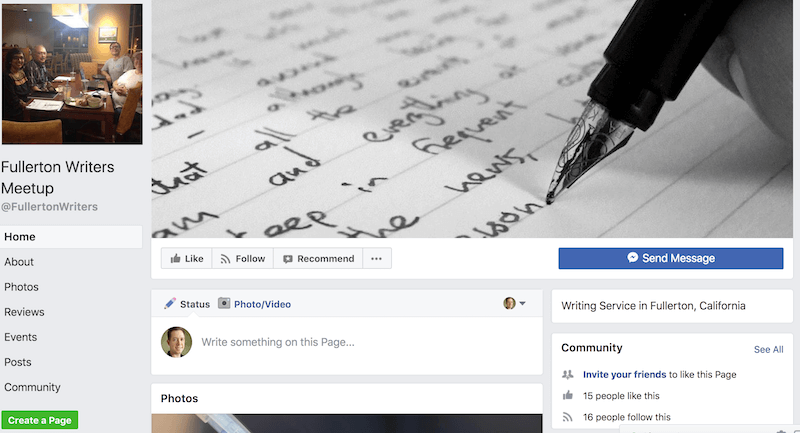
Don’t they look like friendly people?
Now, if you don’t find a Facebook Group in your area, you have two choices:
- Start one. That way, the next person who searches will find YOU.
- Reach out on Big Facebook. I mean reach out to all your friends with a post asking if anyone knows writers in your area. Think about this: multiple each of your friends by the amount of friends that they have. You have a potential reach of 100,000s of thousands of people, and somebody (probably your eccentric Auntie Sue) will know a writer in your area. And bingo: a connection.
- Join a Facebook group that isn’t local.
13. Use the Network of Local MFA Programs
 Even if you’re not enrolled in an MFA program, you can still benefit greatly from their community.
Even if you’re not enrolled in an MFA program, you can still benefit greatly from their community.
They are probably having visiting writers give public readings, and you can go there and start to make friends with the professors (who are accomplished writers), and meet some of the other writers in the program.
If you ask them questions about local writing services, they might be able to give you some additional tips.
I’ve done this with the Chapman MFA program and that’s how I discovered my writing group — they are all graduates of that MFA program. And that’s a local community I’ve kept for the last 9 years, regularly meeting once a month and exchanging work.
I’ve also done this with the Irvine MFA program and made quite a few friends who have gone through that program and now are out in the world, rocking the publishing university and being their awesome writing selves. I usually only see them at conferences, but still, they are valuable contacts for grants, networking, beta readers, and a host of other intangible benefits.
14. Start a Book Club
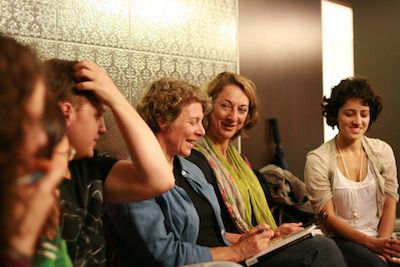 Now, I know this advice seems counterintuitive. Why would you start a book club to read books if your sole goal is to build a writing community?
Now, I know this advice seems counterintuitive. Why would you start a book club to read books if your sole goal is to build a writing community?
Fox, you say, I’m not looking for readers, I’m looking for writers.
Well, hold your horses, Bookfoxers. Starting a book club with other readers is a great way to build a community of people who value books, even if they aren’t also writers.
If fact, it’s actually essential for you to have a community that includes people who aren’t writers, in order to avoid the critical error of writing only to other writers (see point #4 on my post about the 10 Great Career Mistakes Writers Should Avoid).
Plus, by creating a community of people who care about books, you might find that these people who will become your friends end up knowing writers, and end up connecting you to those writers. Think long term. Think not about finding a direct connection, but finding a person who will lead you to the writer who will really help you.
Your writing networking will often work in a two-step like that.
15. Go to Librarian Conferences
 Okay, this seems like weird advice, but bear with me.
Okay, this seems like weird advice, but bear with me.
I have a librarian neighbor and friend who told me to go to the ALA conference in Anaheim, CA, which is about 20 minutes away from me.
So why not? I went. It was cheap and near me.
It was truly an education. I mean, this was much more intense than just asking your local librarian for help.
You learn what books are coming out, and you meet the people who pretty much know more about the book world than almost anyone else. They know the local authors (because they host their readings), and can connect you with people across the industry.
I mean, it was really eye-opening for me, and not only helped me to connect with several other authors in the area, it also helped me to realize what to do to market my own books to libraries.
All in all, I got a quick education from the side of the industry I don’t normally see (usually I’m more on the publishing/academic/writer’s side of things).
BONUS (#16)
Check Meetup.com for local meetings.
I just checked the Meetup listings in my town and found a “Writer’s Circle” meeting at the library the very next day.
If there isn’t a meetup for writers in your area, I would recommend you start one and attract other writers to yourself.
Online Writing Communities
 Now, you might live in a backtrodden, back alley of the world where nobody other than you is a writer. And you know what? That’s perfectly okay.
Now, you might live in a backtrodden, back alley of the world where nobody other than you is a writer. And you know what? That’s perfectly okay.
Because you’re experiencing things that all the other writers aren’t, and that’s going to make your fiction more unique.
And what’s more, we have this marvelous invention you might have heard of called The Internet, and using this marvelous invention you can connect to other people remotely, from the comfort of your extremely plush writing chair with double butt indents!
In fact, back in the ancient medieval ages of pre-Facebook I used to be part of some very cool communities in the form of message boards, such as the Zoetrope All-Story Boards (anybody remember those? Geez, I’m dating myself).
Just know that online communities tend to die out quickly. Book Country, Authonomy, Figment, Webook — have all gained loyal followers, been hailed as the new, next, best community for writers, and then died an abrupt death.
But here are some communities you should check out.
Wattpad is one of the biggest sites for a writing community, and you gain points through posting videos and commenting on others work. If you get a story featured, you’ll get some pretty serious readership. Over time, you can isolate the readers/writers that are the best fit for you and continue to build those relationships both inside and outside the site.
This one is smaller than Wattpad but still pretty cool. It’s chock-a-block full with news about forthcoming books, and there’s a good community of writers sharing their work and getting feedback on it. With this site and all other community sites, make sure that only logged-in members can view your creative work, or else publishers/agents/editors will consider it published and you won’t ever be able to sell it.
This is a great message board where you can get an education in the inner workings of the publishing industry. They have everything from beginners (The Guppie Pond) to advanced, experienced writers in the industry. It’s also a great mix of industry advice (how to approach an agent) and more practical advice on the writing craft (how do I pull off a roving 3rd person limited POV?).
If you’re a self-published author (or want to go in that direction) this is the right community for you. It’s a pretty simple, message-board format (in the late 90s/Reddit style), but what’s important is that you can share tips with fellow authors and gain from their knowledge.
Booksie is a site where you can post your writing and connect with other writers and readers. And they’ve even had some writers gain a fan base and then nab a big contract for one of their novels.
If you’re looking for beta readers and critiques on your manuscript, this is the site for you. They also have sub-forums for specific genres (like sci-fi), so you can find your ideal reader to give you feedback.
If you write Sci-Fi, Fantasy, or horror, this is the right group for you. They have moderators that keep the conversation civil, and you will find lots of like-minded writers who will critique your work and give you advice about the writing life.

8 comments
Thank you so much for this invaluable information. Please keep up the good work.
Great article! Would love it if you could add https://www.writers-connection.com to your online community list. This is a growing community of writers and authors with a strong social media presence and multiple ongoing events to connect and educate authors writing and looking to publish great books.
Thanks for taking the trouble.
Very helpful advice
Thanks! This inspires me to get more connected.
I can’t say enough about the benefit of writers groups. I just published my first novel. If it weren’t for a chance invitation to join a local group it would never have happened. Meeting with them and hearing both their success stories and challenges kept me motivated. If I missed a meeting or two one of the members in particular would text me things like, “I’ve seen your stuff. I know you can tell a story. We miss seeing you.” All groups have different dynamics so find the one that fit you. I live in a small city in N. Carolina and know even we have at least two writers groups. I think becoming a member of such a group is especially helpful for beginning writer as it gives you admission into a community of individual who, while possessing many different views and interests, have one passion in common.
Thank you for all this great information!
I totally love this, and I can’t appreciate it enough. Having just assumed the office of president of my English Department’s writers club at the university, this article comes in as a very resourceful tool for finding great things to implement. It’s going to be fun. Thanks.